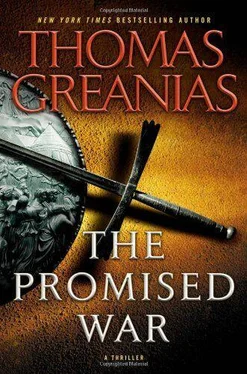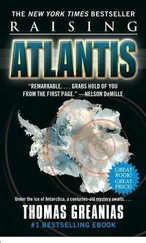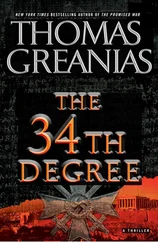Thomas Greanias - The Promised War
Здесь есть возможность читать онлайн «Thomas Greanias - The Promised War» весь текст электронной книги совершенно бесплатно (целиком полную версию без сокращений). В некоторых случаях можно слушать аудио, скачать через торрент в формате fb2 и присутствует краткое содержание. Жанр: Триллер, на английском языке. Описание произведения, (предисловие) а так же отзывы посетителей доступны на портале библиотеки ЛибКат.
- Название:The Promised War
- Автор:
- Жанр:
- Год:неизвестен
- ISBN:нет данных
- Рейтинг книги:5 / 5. Голосов: 1
-
Избранное:Добавить в избранное
- Отзывы:
-
Ваша оценка:
- 100
- 1
- 2
- 3
- 4
- 5
The Promised War: краткое содержание, описание и аннотация
Предлагаем к чтению аннотацию, описание, краткое содержание или предисловие (зависит от того, что написал сам автор книги «The Promised War»). Если вы не нашли необходимую информацию о книге — напишите в комментариях, мы постараемся отыскать её.
The Promised War — читать онлайн бесплатно полную книгу (весь текст) целиком
Ниже представлен текст книги, разбитый по страницам. Система сохранения места последней прочитанной страницы, позволяет с удобством читать онлайн бесплатно книгу «The Promised War», без необходимости каждый раз заново искать на чём Вы остановились. Поставьте закладку, и сможете в любой момент перейти на страницу, на которой закончили чтение.
Интервал:
Закладка:
"What's this for?" Deker said, fighting to keep his voice from shaking.
"To take with you inside the city when you go back," Kane told him. "Bin-Nun says you've proven yourself. Both with the intelligence about Hamas' plan to cut us down at the water, and by damming the Jordan at Adam. He never expected you to get this far. None of us did. Now only one thing remains: the walls."
Deker took the bowl, wrapped it in sackcloth and put it in his pack and counted fifteen C-4 bricks left from his original cache. It wasn't as much power as he wanted. He would have to be pinpoint accurate with where he laid the blasts and how he allocated the bricks between them. Assuming he got that far.
"God is my strength and power," Kane told him. "He teaches my hands to make war, so that my arms can bend a bow of bronze. But I have not seen such a display of his power in anyone besides Moses-and you."
"What are you saying?" Deker asked.
"Even Moses did not set foot where we stand-east of the Jordan. Because he could not control the power God had granted him. Be careful, Deker. Once you set loose the power of God, even you cannot control it."
34
Sam Deker flew like a phantom under the full moon, through the forests of palm trees, farmlands and abandoned hamlets. He wanted to save Rahab as much as Israel. But it was Rachel's death he remembered now as he ran toward Jericho.
It was Monday, March 29, 2010. Passover.
Deker sat in the cafe, sipped his coffee and stared through the window at the three-story yellow bungalow across the narrow street in East Jerusalem. He glanced at his new Krav Maga watch, a gift from Rachel. Ten minutes past six, which left him twenty-two minutes until sunset. Rachel was probably at the Western Wall by now, preparing her Shabbat candle for the first evening of Passover and herself for disappointment when he failed to show up for her yet again.
He patted the pocket of his dark kurta shirt and pulled out a small pen-shaped detonator with a red button at the end. A single tap would raise the trigger. A second tap would detonate the C-4 explosive disguised as a ceramic bowl inside the bungalow's second-floor parlor. He twisted the safety feature at the base of the pen to reset the trigger to prevent any premature accident and put it back in his pocket.
The bungalow was an elegant older building crammed between the newer multistory apartment buildings. It was also the home of Abdul Omekh, who had served as chief of staff to the former Palestinian Authority president, Mahmoud Abbas. These days Omekh was a professor of modern history at Al-Quds Open University and lectured that the Jews had no historical connection to Jerusalem or the Western Wall.
Tonight Omekh was hosting a special dinner of great interest to the IDF. Four cars already had pulled up and left within the past half hour, depositing guests. One of these guests, according to IDF intel, was the Black Dove, a Palestinian mole within Israel's counterterrorism unit whom no one had been able to unmask.
Deker was a demolitions specialist, not an assassin, and he had told his superiors that he thought this plan was a bad idea. Already he could imagine the lead in the Jerusalem Post: "A powerful bomb blast killed one of the Palestinian Authority's leading political scientists last evening in East Jerusalem as he sat down to dinner with family and friends." University students and colleagues would describe Omekh as "a respected professor." Hard-liners would describe him as "a revolutionary martyred by Israeli terrorists."
Deker instead suggested placing a camera in the bungalow to make the identification and deal with Black Dove at a time and place of the IDF's choosing. But his crazy new superior, Uri Elezar, insisted it was better to take care of the Black Dove now and identify him later through dental records.
So last week Deker and his partner Stern paid a service call to the bungalow in a Gihon Water and Sewage Company van. The rains must have backed up the sorry sewers in the street again, the housekeeper explained, and now the stench was filling the home only days before an important dinner. When Stern returned to the van an hour later with a plumber's snake and planted a bag of clumpy drain blockage, he handed Deker the bowl from the table in Omekh's parlor.
It was the first time Deker held the original bowl in his hands, and he was pleased with how exact a replica he had made of it with his C-4 bowl based on photos Stern had snapped from his first service call a few days prior. So exact was his copy of this bowl that for a second he worried Stern had botched the switch. But then he saw a chip beneath the base of the bowl and got angry with Stern.
"Did you chip this bowl?" Deker demanded.
Stern looked doubtful. "I don't think so, boss."
Deker swore. "My bowl has no chip," he said, and started reviewing the photos of the bowl that Stern had snapped before. He couldn't see a chip. "What happens if Omekh sees that his bowl has magically repaired itself? He'll know it's been switched, and we won't get another shot at the Black Dove."
So far, however, it appeared that Omekh had noticed nothing. The GPS tracker in the bowl showed it was still in Omekh's parlor.
Now the last car pulled up and Deker saw one of the few guests he could identify-a Hamas section chief-step out, followed by two more men Deker didn't recognize. They were patted down at the door by two plainclothes security types and then disappeared inside. The car drove off and Deker took out his monocular and looked up at the second-floor window. All the guests had gathered in the parlor. Everybody who was going to attend had arrived.
Deker glanced at his watch. It was 6:15 p.m.
The bronze sky outside the cafe seemed to weigh heavily over the squat buildings as sunset neared. But the narrow street was livelier than Deker had hoped. There were women carrying grocery bags, boys riding bicycles and street vendors hawking their wares. The explosion would shatter windows for fifty to one hundred meters around, and Deker worried about injuring innocents in the street.
Rachel, of course, would be mortified to know that this was why he had missed her at the Western Wall tonight. Nasty business, and he was through with it. Which was why he would never tell her, only ask her to marry him and move back to the States, where she could pursue her graduate degree in psychology and then spend the rest of her life rehabilitating him.
The thought of Rachel was the only thing that could bring a smile to his face. She knew something was up. She had come in on him at his apartment when he was hiding Omekh's chipped bowl in his closet. She must have suspected he had already picked up an engagement ring. She had made some passing remark at dinner a few days later about "conflict" or "blood" diamonds and how important it was to make sure you knew where things really came from, and not to support industries that exploited children or funded wars.
Fortunately, he would be able to assure her that the diamond he was giving her had come from his nana, and the only conflict it had seen was World War II. They could then talk about their bright, open future together. Deker yearned for that kind of innocence and passion for life again-before his two wars with the U.S. in Iraq and Afghanistan and this recent stint with the IDF in Israel.
Rachel was the way.
Deker looked at his watch. It was 6:16 p.m. He could picture her right now at the Western Wall. He could see her pour the water into a special bowl for the Shabbat hand-washing ceremony and dry her soft, strong hands with her little towel. And now, at exactly eighteen minutes to sunset, she was lighting her Shabbat candle.
As the candle burned, she would spread her hands around the flames and draw them inward in a circular motion three times to indicate the acceptance of the sanctity of Shabbat. Then she would cover her eyes and recite the blessing:
Читать дальшеИнтервал:
Закладка:
Похожие книги на «The Promised War»
Представляем Вашему вниманию похожие книги на «The Promised War» списком для выбора. Мы отобрали схожую по названию и смыслу литературу в надежде предоставить читателям больше вариантов отыскать новые, интересные, ещё непрочитанные произведения.
Обсуждение, отзывы о книге «The Promised War» и просто собственные мнения читателей. Оставьте ваши комментарии, напишите, что Вы думаете о произведении, его смысле или главных героях. Укажите что конкретно понравилось, а что нет, и почему Вы так считаете.












